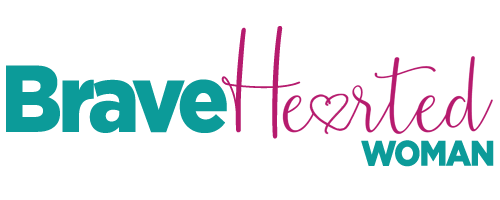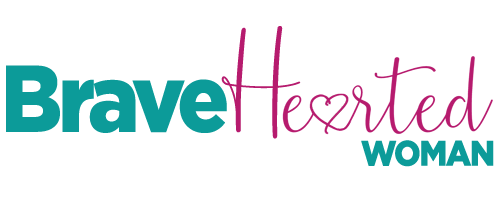5 Steps To Break A Habit
Are you struggling to break an unwanted habit? Do you find yourself relying on self-discipline and willpower alone to stop repeating it? I got you!
Welcome to today’s episode of ‘The BraveHearted Woman’ Podcast with your host and braveheart coach, Dawn Damon where your heart meets your life’s vision. This is a go-to podcast for empowering women with beautiful visions for their lives who ultimately desire to live with purpose, find their brave, and fulfill dreams.
Today, let’s define habit. A habit is a routine behavior that is repeated regularly and tends to occur subconsciously. Habits can be good or bad, and they can have a powerful impact on your daily lives ~ influencing your decisions, thoughts, and behaviors.
So, breaking an unwanted habit can be challenging but rewarding. As habits are those behaviors that become automatic through repetition, and breaking them requires that conscious effort to change the pattern. Some unwanted habits are trying to quit smoking, reducing screen time, eating healthier foods, and the like. In the end, breaking a habit can help you feel more in control of your life which can improve your well-being.
So if you can’t seem to shake off that pesky habit, tune in to this week’s episode to find out how long it really takes and what you can do about it.
Timestamps:
0:00 - Intro
0:51 - How to break a habit?
1:12 - Understanding the logic behind breaking a habit.
3:16 - What are the steps in breaking a habit?
3:26 - Step 1: Mindfulness.
5:25 - Step 2: Replace it.
7:05 - Step 3: Remember your why.
7:59 - Step 4: Prepare & plan.
11:28 - Step 5: Reward yourself
12:45 - How to take action?
12:58 - FREE GIFT! Brave Vision Blastoff! 2023 Workbook
Quotations:
“Making a new habit takes about six weeks to solidify a new behavior and make it really natural.”
“Unwanted habits can be broken!”
“You have to be mindful of what habit is that you want to break.”
“A lot of times, we have a habit because we have an emotion coming and we don’t want to feel that emotion.”
Resources:
- FREE GIFT | Brave Vision Blastoff! 2023 Workbook by Dawn Damon: http://bit.ly/3YsBucc
- Get a copy of Dawn’s books here: https://dawndamon.com/books/
- Book a strategy call with Dawn: https://dawndamon.com/high-level-mentoring-coaching/
Connect with your BraveHeart Mentor, Dawn Damon:
- Email me at: info@DawnScottDamon.com
- Website: https://dawndamon.com/
- Instagram: https://www.instagram.com/dawn_damon/
- Facebook: https://www.facebook.com/MentorDawnDamon
- YouTube: https://www.youtube.com/@DawnScottDamonPastor/
Download the full transcript here.
Transcript
While they say it takes three weeks to make a habit, but really realistically, experts believe that it takes about 10 weeks, maybe even up to three months or more to break an unwanted habit. Of course, some habits may take more or less. But in this episode, we're going to talk about what it takes to break that pesky habit. So stay tuned. It's all coming your way.
So let's talk about these habits. The amount of time that it takes to takes to break a habit, or to create a habit really depends. Now making a new habit in 21 days, but really, it takes about six weeks to solidify a new behavior and make it really natural. So where if you don't even have to think about it anymore? But in this episode, I want to talk about what it takes to break a habit.
There are a few things according to research that really will make a difference. Those things include, first of all, how long have you had the habit? Because with every habit, there's a neuro pathway. There's a cable of neurons and wires that have been developed over time. At first, a habit might be as thin as a hair, but over time, it gets thicker and thicker and thicker, like a real thick cable. And it's going to take a little bit of time to undo that and break that habit.
Another element of a variation of how long it takes to break a habit is what's the emotional or physical or social need that the habit fulfills. Because you're getting something from it. There's something pleasurable that this habit is giving you that may even make you feel threatened or feel fearful or insecure if you don't have it. So you have to understand what's the emotional navigation for this, ‘What am I going to do instead of reaching for this habit as another element, and breaking an unwanted habit?’
By the way, you can do it, unwanted habits can be broken. I'll just put that in there right now. But whether you have support or not if you have a really embedded thick, long-term habit, or even an addiction, which is a habit that you need to break, you're going to need some help. You're going to need some support. That's just how it works. How many times have people thought, ‘Oh, I'm gonna go out on my own,’ ‘I'm gonna do this,’ ‘I got this one,’ only to relapse and cycle back and go around the mountain and other times? And that's because, with long-term habits that are really stubborn, and embedded. You're going to need some support and help.
And then another variable would be the physical or emotional reward that the habit provides. This is similar to what I mentioned just a moment ago, but what are you getting from the habit in terms of the instant dopamine hit? Smoking gives you that immediate rush to doing drugs, of course, having a drink or some other things, and sexual addictions give you that immediate, so what's the reward? So you're gonna have to be careful and identify one of these things.
But today, I want just to give you five steps that will help you break unwanted habits. Are you ready?
First of all, mindfulness. That's obvious, right? You have to be mindful of what habit is that you want to break. But also you have to know the nature of the habit. What's the DNA of the habit? When is it that I want to do this thing? What do I feel when I want to do this about what's going on in my life? What is triggering me? It can help you develop awareness around what you're feeling, what you're thinking, and what you're experiencing.
A lot of times, we have a habit because we have an emotion coming and we don't want to feel that emotion. We don't want to maybe look at that situation. So we'll reach for our habit instead. This often happens with food, TV or entertainment, or anything that would maybe just take our minds chopping take our minds off something. So what's going on when you want to do this habit?
Be mindful. Observe it this practice involves some impulses that are coming when you want to do this habit without judging, without shaming, and without really reacting. You just become more aware of what's triggering you, what the routine is with the behavior, or what triggers which lead you there. Because A might lead you to B, B might lead you to C, and D is the unwanted habit. But if you might find that I'm going to get to B or C. Then there I am with D, and I've relapsed. So consider what the cues are. Learn how to avoid those cues. Consider other options, and change your routine up a little bit. But things A, B, and C lead to the habit, and then finding the discipline not to act on those urges, which if you had the discipline not to act on the urges. Maybe it wouldn't be a habit anyway.
So taking steps to learn what the triggers are around the habit will help you prepare yourself so that you're not leaning on self-discipline alone or self-control. At the end of the day, willpower won't get it done. You're going to have to have some other things, some other supports in place to keep you from repeating that habit number to replace it. We find it's easier to break a habit if we replace the unwanted behavior with a positive behavior that we do want. So instead of simply trying to stop something, let's swap it out for something more suitable and desirable.
For example, let's say that every afternoon, when you're at the office, you get that sugar urge, you want to eat some candy, you want to have some kind of snack, and that's your body crying out for that because you might be addicted to sugar. Who knows. So you reach for the candy bowl. But now you want to break that habit. So instead of just saying like, ‘I'm not walking over there, I'm not going to go to that candy bowl. I'm not going to do that.’ You're just relying on willpower. No, swap it out! So have a substitute ready? How about some pickles, some olives, how some celery, some nuts, and maybe some dried fruit, which warning some of this can be filled with calories, that dry fruit but have a healthy snack option available to you? So that when you want to reach for the candy, you have something else that can satiate you, maybe some sea salt popcorn, something that is better for you. Then you can eventually reduce the popcorn and keep making changes till you get the new behavior. And you'll start to feel the reward of the new behavior and your body won't be screaming for the old behavior as much. And eventually, when you see those rewards of the new behavior, more energy, less sugar, spikes, and crashing, then the urge to repeat the old behavior begins to diminish. You're really enjoying the benefits of the new behavior and you're well on your way to breaking that habit.
A third step that I want to offer you today is to remember your why and remind yourself why do I want to break this habit. How will my life change? How will I grow? How will I benefit? Why is this habit destructive for me at this time in my life? Remember your why and then post where is it that you break down and fall into repeating this habit. If you're not wanting post a sticky note there post a sticker or any other visual reminder on the refrigerator, in the car, in the bathroom, by your nightstand, in your living room on the remote control, or whatever it is to help you rethink the action to interrupt that. Then you can always change your physiology to when you see that sticky note then you'd stop yourself you interrupt it. You sing a song, you clap your hands, and you do something that says I'm remembering. ‘I don't want this behavior!’ I'm connecting to why I want to change this.
So number four, prepare and plan. Relapse can happen. In fact, we often say in recovery, relapse is a part of recovery. So be ready. Have a plan. Be prepared because the urges don't go away forever. They might crop up when you least expect it or the urge to repeat an old behavior may come up with you feeling a place of stress or you've had some kind of life change the loss of someone that you've lost your job or during CoVid. There were a lot of people who fell back into old behaviors and habits that they broke. They were on a great trajectory and they were their weight was under control. They had stopped smoking. May they stop drinking they had stopped watching During a lot of TVs, they were doing the thing, doing the do as we used to say. Then all of a sudden, their world got all of our worlds got disrupted and turned upside down. There are many people who will report even still today that they're stuck. They don't know how to get traction again.
By the way, as your Braveheart mentor, I can help you get traction. If you're interested in coaching, I want you to reach out to me at damon.com, or at dawnscottdamon.com. In fact, I'll offer you a third one brave-hearted woman go to the braveheartedwoman.com. And there you'll see my resources for overcoming that reach out to me, I'd love to help and support you get going again, and get on the stack. Maybe I'll do a podcast on that too. But you have to keep making forward movement.
So if you can prepare and plan to know that relapse could come. Then again, have your substitutes ready. Have them present. Remove temptations. Don't think that your willpower is going to be great if your cupboards are filled with snacks or the alcohol cupboard is filled or the remote control is easy to get to put it up high somewhere you gotta get a ladder to get it. Whatever it is, interrupts the ease that it takes to repeat the old habit and makes it easier to do the new behavior. Don't forget to journal. Think about how you're feeling, and track your moods. Sometimes when we're feeling discouraged or low or down or vulnerable. That's when those old habits come again, that's when you need to phone a friend or use a lifeline.
Be gentle with yourself. If you do mess up. It's just a moment. It's just a hiccup. We often say like we don't say ‘Oh, I failed,’ or ‘I blew it,’ or ‘I messed up’. Like I just said maybe we zigzag, zag zig, and I zag. I like to zig zig zig zig, but sometimes I zag. It might have been a zag day, who knows? But call a friend. Get some support from someone who knows what you're going through or what your struggle is.
Again, don't forget to change your physiology. Grab other options to break up. Move your body. Get away from the temptation, but also plan by this habit. Don't give yourself an unrealistic goal that you're setting yourself up to not do as well. If you would, bite-size, make it small, achievable goals. Remember, grow into the habit. As it becomes more automatic. You can up the ante say you say, ‘My habit that I want to break is I'm sedentary.’ I don't move. So my new habit is going to be, ‘I'm going to work out seven days a week.’ An hour of cardio and the bad idea of, ‘No, that's not going to work, you're not going to make it.’ So start small. some push-ups are better than no push-ups. One setup is better than no sit-ups. 10 minutes on the treadmill is better than no minutes on the treadmill. Start small and work your way up.
And then number five, with habits we know that our brain wants to be rewarded. So breaking a habit, remember is incredibly difficult. The longer you've had it, the more challenging it becomes not impossible, but for sure challenging. So make sure that you acknowledge how far you've come. Even if you took a baby step. Reward yourself. Give yourself some props along the way. Small motivators, you don't have to go out and buy a new outfit or take a vacation just because you made one great step. But look in the mirror science tells us this works. Look in the mirror, give yourself a high five say well done good job you did it. Boosts your confidence, and increases your drive by rewarding yourself, patting yourself literally on your body, getting rid of negative self-talk, and saying out loud to yourself. ‘Good job. Braveheart, you did it.’ That was not easy and starting should be rewarded. ‘Let's do it again tomorrow.’ We don't have to do it for 30 days. That's just taking the next right step. Let's just say we're going to do it tomorrow. Who knows after that, and tomorrow? You can make the decision to take one more step. Anyway, when you focus on the progress you made, you're less likely to become discouraged. So focus on your pride, your focus on the progress of your project, and then reward yourself.
So that's what I have for you today. I want to remind you that this is your opportunity to become brave. This is your opportunity to take an inventory of your life and say, What am I doing where am I going? Am I meeting my goals? Do I Have goals?
ed the Brave Vision Blastoff!:That's what I have for you today. And don't forget if you're on YouTube like me, love me send me some hearts because I love when I see those. Hope you're doing well. I'm going to leave you like I always do. This is Dawn Damon your Braveheart Mentor telling you to find you're brave and live your dreams!





